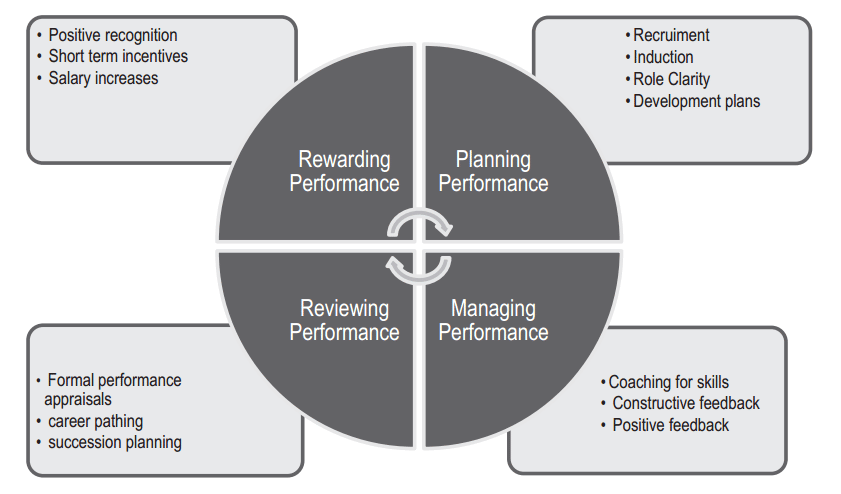In a true performance culture, the focus and effort are placed on (a) maximising the performance of each individual, irrespective of their role, level of capability, etc. and (b) enabling each individual to strive to reach their true potential, irrespective of what that is. In such a culture, performance management is management; and leadership directs, enables and energises it. The organisation is focused on hiring the ‘right’ people, setting them up for success with a powerful induction program and following that with clear direction, managers that coach and empower and provide feedback both constructive and positive.
The aim of performance development is to further develop a culture in which individuals and work teams take responsibility for the continuous improvement of the organisation. The specifics of a performance culture are unique to your company because they are based on what will work best for you to get you to where you want to go within the parameters you have defined. There is no ‘one size fits all’ when it comes to culture.
What is a performance culture?

The performance management cycle
The following diagram summarises the performance management cycle and the process for driving a performance culture.
This cycle is an on-going process for communication and is based on the following guidelines:
- Talk often. You should be communicating informally daily with your team members about performance and formal performance conversations should be happening at least monthly.
- Communicate expectations clearly. A large part of your role is communicating expectations and the reasons for them.
- Provide positive feedback. Keep the ratio of positive to negative feedback at least 4:1.
- Link past performance to future goals. For example, “If you didn’t achieve your target, let’s look at why. What can we do to make sure that you can achieve your target next week?”
- Think like a coach. Look for coachable moments – those occasions that give you the opportunity to create wisdom in others.
The importance of induction
One of the most important elements of driving a Performance Culture in a retail business links to the induction of new team members. Keeping in mind that you never get a second chance to make a first impression, you should make absolutely sure that new Team Members feel welcomed, valued and prepared for what lies ahead.
An investment in effective induction is an investment in employee retention, morale and productivity. Research consistently demonstrates the connection between effective induction processes and engagement. Not only is the induction process an opportunity to set your new team members up for success, but it is also an opportunity you can leverage to increase employee engagement.
Purpose of the induction program

- To reduce start-up costs
- To reduce anxiety
- To reduce employee turnover
- To save time for the manager
- To develop realistic job expectations, positive attitudes and job satisfaction.
The following points include best practices for an induction;
- Plan your induction program from the start. Also, consider what impression/impact do you want to create on a new employees first day and what positive experience can you provide for the new employee that he or she could discuss with their family at the end of the first day of work?
- Provide them with a “who’s who” in your organisation – think about how to represent this visually.
- Provide a timeline of goals the new employee is expected to meet. If the new Team Member is not delivering on time, this should be discussed as soon as possible – manage any performance gap early on.
- Introduce them to the team as soon as possible.
- Provide an appropriate mentor/buddy to explain available resources, provide an understanding of internal communication and how to tackle problems that might arise. Core criteria for a strong mentor may include an established track record and reputation within the company, enthusiasm and commitment to mentoring and availability.
- Provide regular constructive coaching and feedback throughout their first month. This should be done in the spirit of empowering them to take responsibility for his or her own experience (more on this topic later)
- Send them a welcome email or letter.
- Take them to lunch or ask others to join them for lunch on their first day.
- Get feedback on the induction program. Survey them to improve the process.
Create a toolkit of quick-hit activities when employees find spare time.
ARA Retail Institute is Australia’s leading retail training provider for both accredited and non-accredited learning programs. For more information, please visit: www.retailinstitute.org.au




















